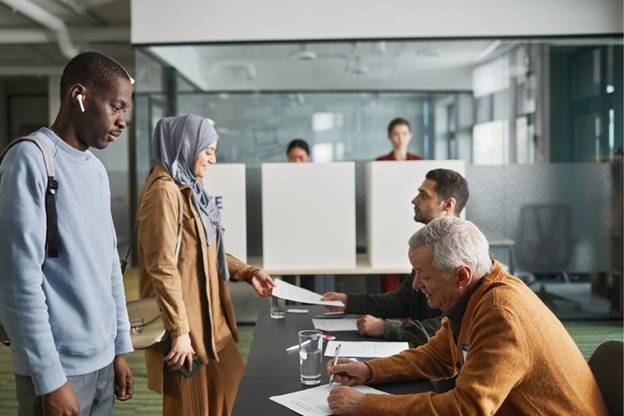
Southern states have enacted legislation to suppress the votes of Black and Brown voters significantly - Canva image
Voting Rights Are Under Assault in the South
By Sunita Sohrabji
CA
More than one-third of eligible voters in Southern states are not registered to vote because of restrictive laws and rampant voter suppression measures.
10 states in the South have the lowest voter turnout of any region in the US with fewer than half of eligible voters turning out at the polls, notes a new report released by the Southern Coalition for Justice and the Southern Leadership for Voter Engagement — SOLVE.
In 2013, the Supreme Court ruled 5-4 on the Shelby County vs Holder case, throwing out two key provisions of the Voting Rights Act of 1965. The ruling opened the door for states to enact restrictive voting laws and made it harder for people of color to vote, noted several speakers at a news briefing on August 8.
Voter Protections Thrown Out
Since the Shelby decision, 29 states have enacted over 100 laws restricting voter access. Prior to Shelby, most of the laws would not have passed the federal approval process, known as pre-clearance, which makes certain that pending voting legislation by a state does not discriminate against voters of color.
“Without those protections in place across the South, we’ve seen a slew of anti-voter bills and anti-democracy laws that have curtailed access to the ballot,” said Sarah Ovaska, senior communications strategist at SOLVE/SCSJ.
Mitchell Brown, SOLVE network coordinator and senior voting rights counsel at SCSJ, said: “There are legislatures across the South that are trying to dilute the power of the Black and Brown vote. They’re basically trying to have politicians choose their voters rather than voters choosing their politicians.”
Gerrymandering
The Shelby decision has also allowed states to create gerrymandered legislative maps, some of which leave communities of color without representation. Many of those maps are being challenged in court.
Third-party voter registration organizations in several states are facing a raft of new regulations, which impose hefty fines if they are not followed to the letter of the law.
Florida’s Republican-controlled Legislature passed SB 7050 in 2023, which severely curtails the rights of third-party voter registration organizations. The League of Women Voters of Florida, Hispanic Federation, and the NAACP filed a series of lawsuits challenging the law, arguing in part that it discriminates against Black and Hispanic voters.
Criminalizing Absentee Ballots
Alabama’s controversial SB 1 criminalizes people who distribute, collect, or help voters fill out absentee ballots. Republican legislators in the state say the measure is necessary to protect against ballot harvesting and illegal voting.
“This bill is another voter-suppressive tactic that historically plagues the progression of our state, while consequently ostracizing the very voters that the sponsors were elected to serve,” wrote the ACLU of Alabama, in a statement opposing SB 1. Governor Kay Ivey signed the bill into law on March 1.
Beverly Cooper, co-founder of Stand Up Mobile, said opposition to SB 1 is significant; she is optimistic that the measure will be thrown out.
“But we know how determined these individuals are about getting exactly what they want. And there is no interest in our state of making sure that it is reasonable and fair and just in terms of how they are approaching this,” she added.
The retired military community in Alabama has been one of the strongest opponents of SB 1, said Cooper.
‘Modern Day Poll Tax’
Former Navy veteran Rosemary McCoy, founder of the Harriett Tubman Freedom Fighters, is barred from voting because she spent 8 months in prison. A 2019 Florida law, signed by Governor Ron DeSantis, states that former felons must pay back fines and other restitutions before they can vote. McCoy owes more than $8,000 which she has been unable to pay. She says the law amounts to a “modern day poll tax.”
Over 1 million people in Florida are disenfranchised from voting because of the law, said McCoy. “If I can’t vote, I’m going to go out and I’m going to get as many people as possible to register to vote and to vote,” she said, adding her organization was birthed from her pain.
Across the US, an estimated 4.4 million Americans are barred from voting due to a felony conviction, according to The Sentencing Project.
Latino Voters
Dayana Iza, Texas state director for Mi Famila en Accion, noted that this fall, 22% of Latino voters will be casting their ballot for the very first time. “The statistics are very exciting. It shows that once we are educated and we can get out there and actually mobilize and turn people out to vote, there can be good and great effect that we see within our community and the people that we elect into these positions.”
Brown said the Supreme Court has been trying to chip away at the Voting Rights Act for the past five years. “We need Congress to step up and pass a new Voting Rights Act. We need some more protections against partisan gerrymandering, against voter ID laws, against felonious enfranchisement, against gerrymandering in general,” he said. – Ethnic Media Services

